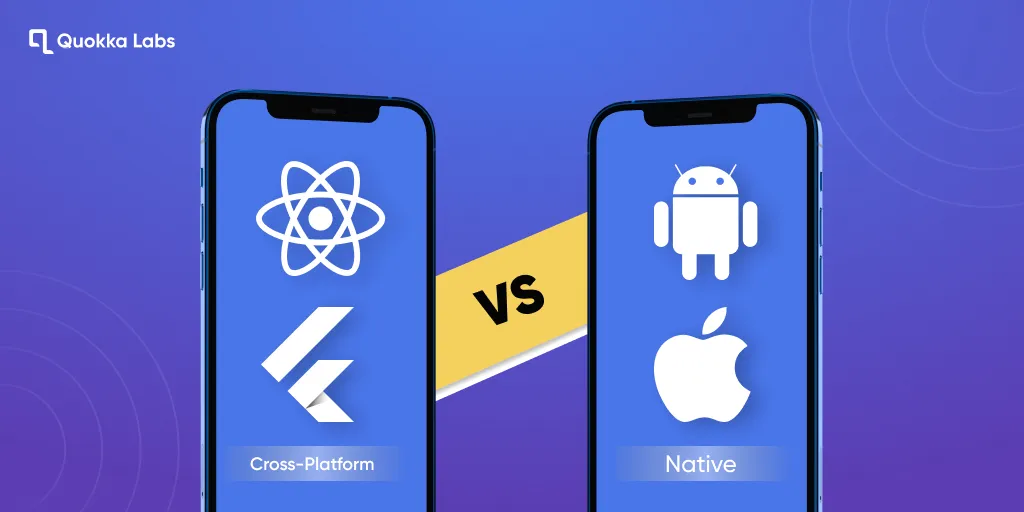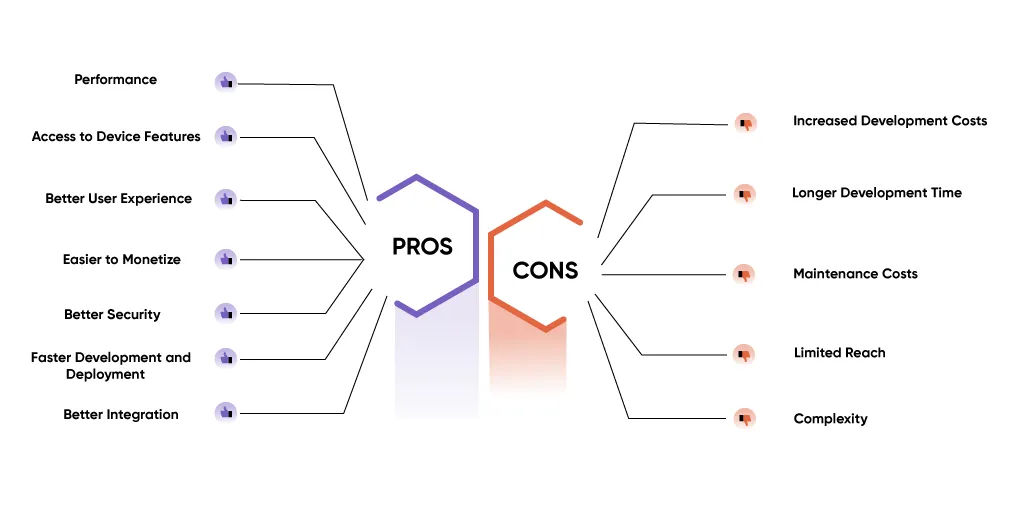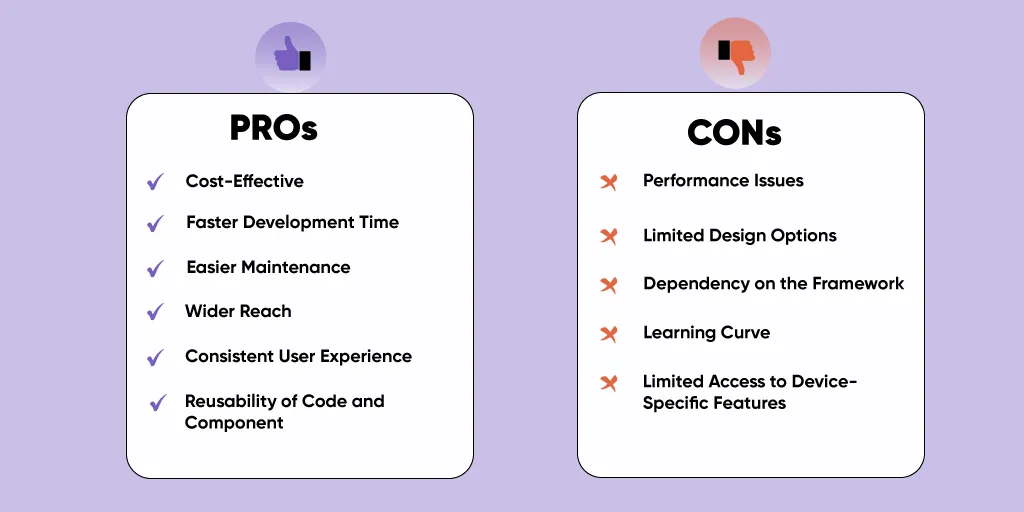Technology


6 min


Mobile apps are now crucial to our daily lives in the digital age, connecting us, entertaining us, and aiding us in our work. But with high demand for apps, a critical question arises - should you opt for native or cross-platform development? This blog compares the pros and cons, tools, and provides a head-to-head analysis to assist you in selecting the ideal approach for your project.

By Anupam Singh
15 May, 2023
Mobile applications have become an essential part of our daily lives in today’s digital age. They help us stay connected, entertain, and even assist us in our work. With the increasing demand for mobile apps, the question arises - which type of app development to choose? Should we go for native app development or cross-platform mobile app development?
This blog will explore the differences between the pros and cons, the tools, and the head-to-head comparison to help you choose the best fit, either native or cross-platform development for your project.
Native application development refers to creating mobile apps specifically designed and optimized for a particular platform, such as iOS or Android. These apps are built using programming languages and technologies that are native to the platform, such as Swift for iOS and Java/Kotlin for Android. Because they are built using the platform's native tools, native apps have access to all the features and capabilities of the device, such as the camera, GPS, and accelerometer. They can also take advantage of the platform's latest features and updates as soon as they are released.
Native apps have better performance and user experience and can be more responsive. They also tend to be more expensive to develop, requiring specialized knowledge and skill in the platform's native tools and languages.

There are several advantages to using native application development, including
Because native apps are built specifically for a particular platform, they can take full advantage of the device's features and capabilities, resulting in faster performance and a smoother user experience.
Native apps have direct access to all the features and functionalities of the device, such as a camera, GPS, accelerometer, etc.
Native apps are designed and optimized for the platform to provide a more seamless and intuitive user experience.
Native applications can be easily monetized through in-app purchases, subscriptions, and advertising.
Native apps have access to the platform's built-in security features, making them more secure than cross-platform apps.
Because developers are familiar with the tools and languages used to build native apps, the development process is often faster, and it's easier to deploy updates and new features.
Native apps can be integrated with other devices and services more easily than cross-platform apps.
Some cons of native application development include the following:-
Developing a separate app for each platform (iOS, Android, etc.) can be costly.
Developing a native app for multiple platforms can take longer than developing a cross-platform app.
Each platform has its own set of updates and changes, which can lead to increased maintenance costs.
A native app is limited to the platform it was developed for, so it will not reach users on other platforms.
Native app development requires a deep understanding of the specific platform and its development tools, which can be complex.
Here are some popular tools for native application development:
1. Xcode (iOS)
Xcode is the official integrated development environment (IDE) for iOS and macOS app development. It includes a code editor, debugging tools, and a visual interface builder.
2. Android Studio (Android)
Android Studio is the official IDE for Android app development. It includes a code editor, debugging tools, and a visual layout editor.
3. Visual Studio (Windows)
Visual Studio is a popular IDE for Windows app development. It supports various programming languages, debugging tools, and a visual interface builder.
These are just a few examples of the many tools available for native app development. The choice of tool will depend on the specific requirements of the project and the developer's expertise.
Cross-platform application development refers to creating software applications that run on multiple platforms or operating systems, such as iOS, Android, Windows, and Mac. It can be achieved using technologies such as HTML, CSS, and JavaScript for web-based applications or cross-platform development frameworks such as React Native, Xamarin, and Flutter. These frameworks allow developers to write code once and deploy it on multiple platforms, reducing development time and cost.
 There are several benefits to cross-platform application development, including
There are several benefits to cross-platform application development, including
Developing a single app that can run on multiple platforms can save a app development cost who compared to developing separate apps for each platform.
With cross-platform or hybrid app development, a developer only needs to write the code once instead of separately for each platform. This can significantly reduce development time.
With a single codebase for multiple platforms, updating and fixing bugs is easier than maintaining separate codebases for each platform.
A cross-platform app can reach a larger audience and be available to more users by running on multiple platforms.
Cross-platform app development makes it easy to maintain a consistent look and feel across different platforms, which can improve the user experience.
Developed code and components can be reused across different platforms, saving time and money.
While cross-platform application development has many benefits, there are also some potential downsides to consider:-
Cross-platform apps may not perform as well as native apps, as the framework may not fully utilize the device's capabilities.
Cross-platform development may not allow for the same level of customization as native development, limiting the design options available to the developer.
The app's performance and stability depend highly on the framework used for cross-platform development. If the framework is not maintained or updated, this can cause issues for the app.
Developing a cross-platform app requires knowledge of the framework used, which can be a steep learning curve for developers unfamiliar with it.
Depending on the framework, the developer might have limited access to the device-specific features, which can limit the app's functionality.
It would be best if you still had a Windows, macOS, or Linux machine with the Android SDK installed to deploy your program on Android. You still need the iOS SDK, Xcode, and only a macOS computer to develop for iOS. The following is a list of IDEs that support the previously listed cross-platform frameworks:
Explore:- Why Startups Prefer to React Native For Mobile App Development
“Looking for Hybrid App or Cross-Platform App Development for your business to boost the productivity and better user engagement? Here we came into existence. As a Cross-Platform development company, we will assist you in taking your business to the next level.”
Here is a head-to-head comparison of native app development and cross-platform app development:
Performance
Native apps generally perform better as they fully utilize the device's hardware and software. Cross-platform apps may have some performance issues as they may not be able to use the device's capabilities fully.
User Experience
Native apps can offer a more polished and seamless user experience as they are designed specifically for the platform they are running on. Cross-platform apps may have a slightly less smooth user experience as they are designed to work on multiple platforms.
Access to device-specific features
Native apps has full access to the device-specific features, whereas cross-platform apps may have limited access.
Development Time and Cost
Native app development can be more time-consuming and expensive as separate apps need to be developed for each platform. Cross-platform development can be faster and cheaper as a single codebase can be used for multiple platforms.
Maintenance
Native app development requires maintaining and updating separate codebases for each platform. Cross-platform app development requires maintaining a single codebase.
Learning Curve
Native application development requires knowledge of each platform's specific programming languages and tools. Cross-platform development requires knowledge of the framework used, which may have a steeper learning curve.
Design
Native app development allows for more design customization, while cross-platform app development may have limited design options.
However, both native and cross-platform app development have their advantages and disadvantages. The choice between them will depend on the specific requirements of the project and the resources available.
Also Read:- Learn To Become a Modern Front-End Developer In 2023
The benefits and drawbacks of native and cross-platform app development are distinct. Choosing either approach depends on the project's requirements and the involved developers' skill levels.
The best option for performance and user experience remains native app development. You'll feel rested despite their higher expense, with fewer defect rates and better images.
Cross-platform apps can be created quickly and easily, but providing the same user experience on each platform will take longer.
Still having trouble deciding whether to develop native or cross-platform mobile apps? Conatct us to receive qualified help from our staff.
What Is a Push Notification and Why It Matters for Your App Strategy
By Dhruv Joshi
5 min read
Top React Native Development Companies to Build Scalable Apps
By Dhruv Joshi
5 min read
How Wearable Technology Is Driving Real-Time Data Experiences in Mobile Apps
By Sannidhya Sharma
5 min read
How to Use Augmented Reality in Retail to Boost Customer Engagement and Sales
By Sannidhya Sharma
5 min read

Technology


5 min
Wearable technology is reshaping mobile apps with real-time insights, enabling smart alerts, fitness coaching, health monitoring, and more. From smart rings to AR glasses, explore how these evolving devices are creating seamless, personalized experiences across various industries and everyday life.


Technology


5 min
Augmented reality in retail helps brands drive sales and reduce returns by transforming how customers discover, try, and buy products. This blog is your guide to using AR strategically, from choosing the right use cases to launching cost-effective AR experiences that delight customers and differentiate your brand.


Technology


5 min
The demand for high-quality video streaming apps has exploded, and it's not just Netflix leading the charge anymore. From niche platforms to corporate media ventures, businesses everywhere are realizing the massive opportunity in OTT app development to launch their own video streaming application.


Feeling lost!! Book a slot and get answers to all your industry-relevant doubts